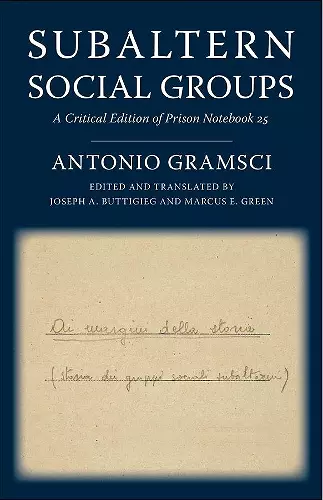Subaltern Social Groups
A Critical Edition of Prison Notebook 25
Antonio Gramsci author Joseph A Buttigieg editor Marcus E Green editor
Format:Hardback
Publisher:Columbia University Press
Published:26th Oct '20
Currently unavailable, and unfortunately no date known when it will be back

Antonio Gramsci is widely celebrated as the most original political thinker in Western Marxism. Among the most central aspects of his enduring intellectual legacy is the concept of subalternity. Developed in the work of scholars such as Gayatri Spivak and Ranajit Guha, subalternity has been extraordinarily influential across fields of inquiry stretching from cultural studies, literary theory, and postcolonial criticism to anthropology, sociology, criminology, and disability studies. Almost every author whose work touches upon subalterns alludes to Gramsci’s formulation of the concept. Yet Gramsci’s original writings on the topic have not yet appeared in full in English.
Among his prison notebooks, Gramsci devoted a single notebook to the theme of subaltern social groups. Notebook 25, which he entitled “On the Margins of History (History of Subaltern Social Groups),” contains a series of observations on subaltern groups from ancient Rome and medieval communes to the period after the Italian Risorgimento, in addition to discussions of the state, intellectuals, the methodological criteria of historical analysis, and reflections on utopias and philosophical novels. This volume presents the first complete translation of Gramsci’s notes on the topic. In addition to a comprehensive translation of Notebook 25 along with Gramsci’s first draft and related notes on subaltern groups, it includes a critical apparatus that clarifies Gramsci’s history, culture, and sources and contextualizes these ideas against his earlier writings and letters. Subaltern Social Groups is an indispensable account of the development of one of the crucial concepts in twentieth-century thought.
The subaltern defined Antonio Gramsci's work. In this volume, Joseph A. Buttigieg's final gift to the world of Gramsci, devotedly assembled and fleshed out by his former student Marcus E. Green, we at last have the full view of how that definition came into being. A treasure. -- Gayatri Chakravorty Spivak, author of "Can the Subaltern Speak?"
Antonio Gramsci's Prison Notebooks have become a kind of Marxist oracle, a well-spring of pithy passages deployed in the service of interminable debates, especially around questions of culture, civil society, the state, history, and the role of intellectuals. On first glance, Gramsci’s 3,000 pages of research, reflections, and analyses may appear random, disordered, even coded. But serious Gramsci scholars know better, and there are few as serious as the late Joseph A. Buttigieg and Marcus E. Green. Their painstaking and judicious reconstruction of Gramsci's writings on subaltern groups raises the bar, revealing with greater clarity the systematic development of his ideas on history, class struggles, folk culture, the state, the dynamic and contingent character of social movements, and the limits of a utopian imagination. This volume challenges us all to stop plumbing Gramsci’s notebooks for jewels and take the work and its context as a whole. Our scholarship and our movements will benefit. -- Robin D. G. Kelley, author of Freedom Dreams: The Black Radical Imagination
Buttigieg and Green have done a remarkable job in making available to the English-speaking world this groundbreaking text of the leading Marxist thinker of the twentieth century. -- Cornel West, Union Theological Seminary
Essential reading for all those interested in Gramsci. By skillfully combining a thematic with a philological approach and including relevant notes from the other prison notebooks, the editors reveal the profoundly historical nature of their author’s thought. History is never shoehorned into predetermined boxes. Gramsci’s theoretical concepts emerge out of history itself. -- Kate Crehan, author of Gramsci’s Common Sense: Inequality and its Narratives
ISBN: 9780231190381
Dimensions: unknown
Weight: unknown
288 pages